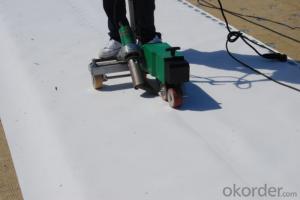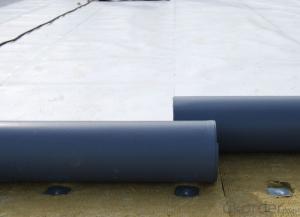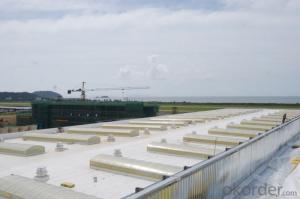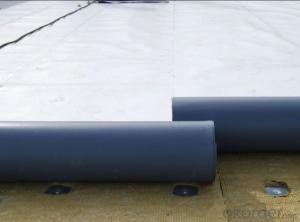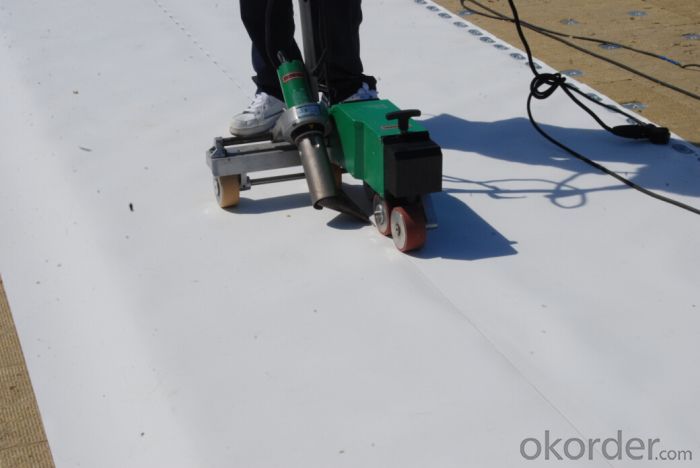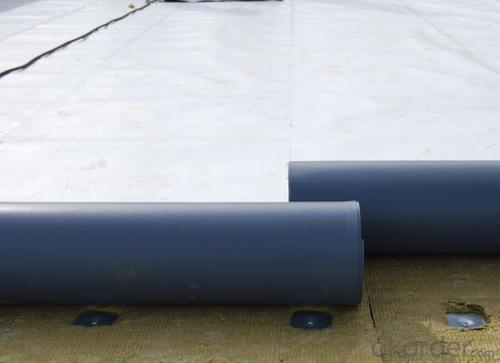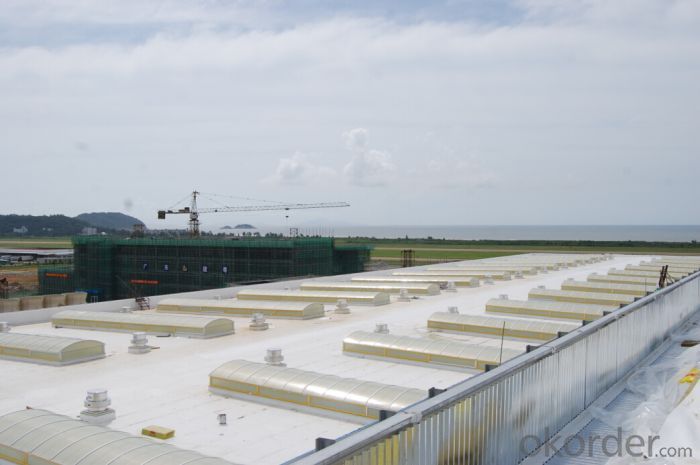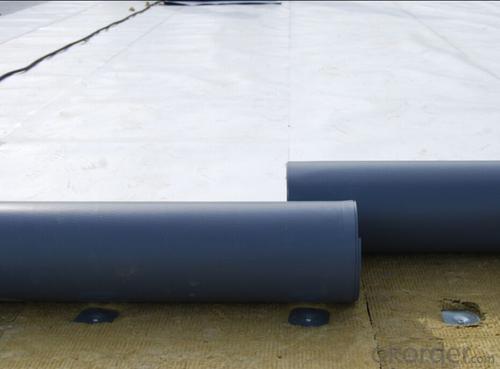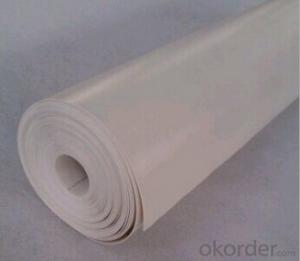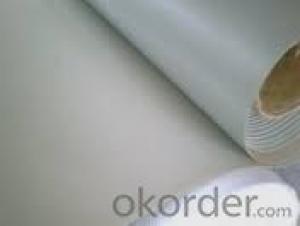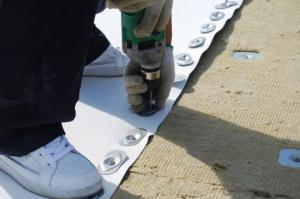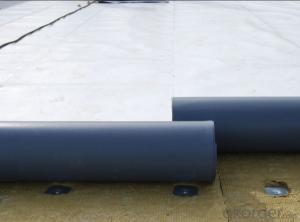TPO Waterproof Roofing Membrane Thickness with 1.0 mm
- Loading Port:
- Qingdao
- Payment Terms:
- TT OR LC
- Min Order Qty:
- 5000 m²
- Supply Capability:
- 10000 m²/month
OKorder Service Pledge
OKorder Financial Service
You Might Also Like
Description Of TPO membrane:
1. TPO Membrane Smooth is made from Thermoplastic polyethylene hydrocarbons , which is for waterproofing of exposed and non-exposed applications.
2. TPO Membrane Smooth adopts the world-advanced equipment of cold feeding extrusion and continuous vulcanization technology.
3. TPO Membrane Smooth is of high elasticity among high polymer waterproof materials and becomes a world-popular waterproofing material.
Main Features of TPO membrane:
- Easy installation with good system integrity, need few accessories
- High tensile and tear strength, puncture resistance
- No plasticizer, heat aging and UV resistance, durable
- Hot-air welding, rapid welding speed, high peel strength (two times of PVC)
-No chlorine, 100% recyclable, environment friendly
- Durable hot-air welding performance and convenient maintainance
- Smooth surface, unfading and stain resistance
Product Advantages of TPO membrane:
1. Weather resistance and durability; Excellent weld ability;
2. No any crisp agents to prevent materials brittleness;
3. Intermediate enhanced polyester mesh fabric to have high tensile strength, fatigue resistance and penetrating resistance suitable for mechanically attached roofing systems;
4. Excellent the same high and low temperature resistance as rubber materials which can keep flexible at -50° C and keep mechanical strength in high temperature;
Applications of TPO membrane:
- Roof construction & steel structure of both industrial and civil engineering
- Underground engineering, such as subways, tunnels, air Raid shelter, etc.
- Sewage treatment, dam, reservoir and basement, grain storehouse, etc.
FAQ:
Q: Can I visit your company?
A: Yes, welcome to visit our enterprise.
Q: Can I do the third party testing before loading?
A: Yes, we could accept the third party testing.
Q: Which kind of payment in your company?
A: We could accept TT, LC at sight, etc.
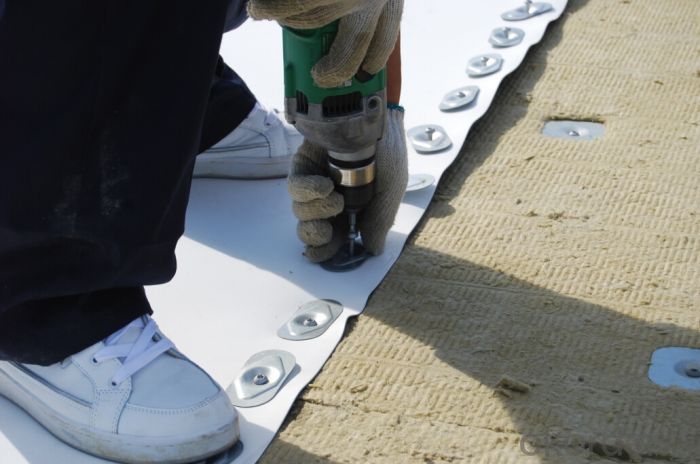
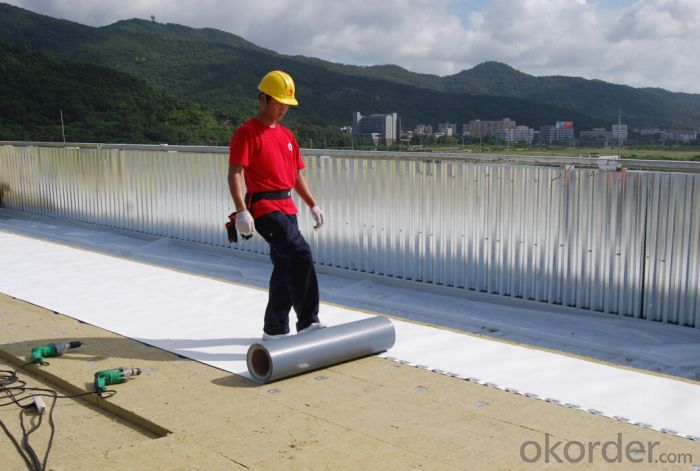
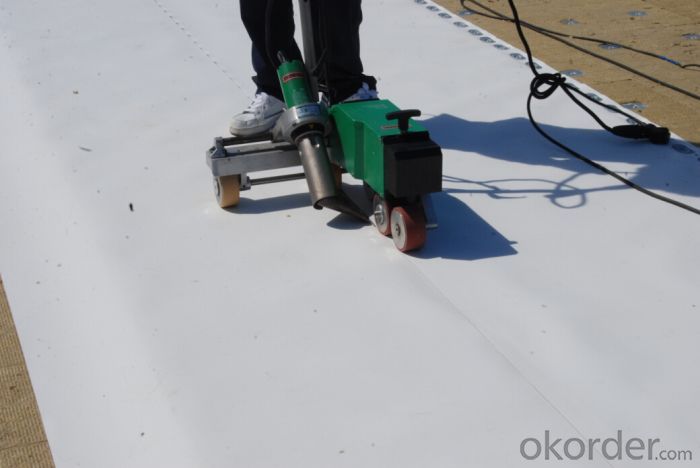
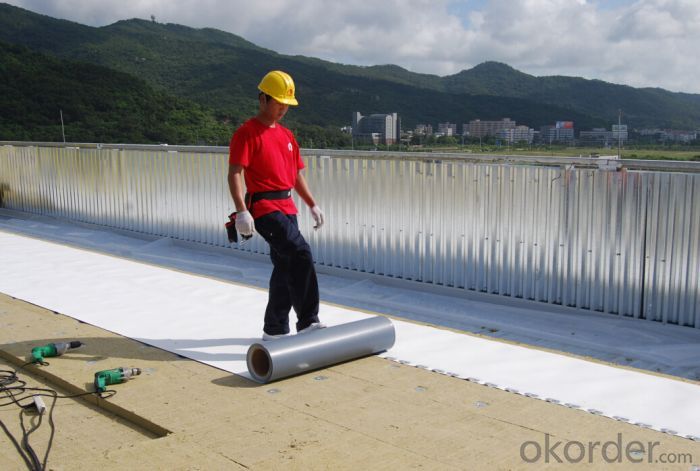
- Q: Can a waterproofing membrane be used in temporary or temporary structures?
- Yes, a waterproofing membrane can be used in temporary or temporary structures. Waterproofing membranes are designed to provide a protective barrier against water penetration, which is essential in preventing moisture damage in any type of building structure. Whether it is a permanent or temporary structure, such as a temporary shelter, tent, or temporary construction site, a waterproofing membrane can be applied to ensure water resistance and protection. It is important to choose a waterproofing membrane that is suitable for the specific needs of the temporary structure and follow proper installation guidelines to ensure its effectiveness.
- Q: Can a waterproofing membrane be used on metal surfaces?
- A waterproofing membrane is capable of being utilized on metal surfaces, providing protection against water infiltration. These membranes are specifically designed to safeguard various materials, including metal, from water damage. They are primarily composed of modified bitumen, EPDM, PVC, or TPO, which offer a resilient and impervious barrier. By applying a waterproofing membrane to a metal surface, one can effectively ward off corrosion, rust, and water-related harm. This makes it a suitable solution for shielding metal structures, roofs, or surfaces that are exposed to moisture or water. However, it is crucial to ensure that the chosen waterproofing membrane is compatible with the specific type of metal surface and that proper installation guidelines are adhered to in order to achieve optimal performance and durability.
- Q: How does a waterproofing membrane withstand freeze-thaw cycles?
- A waterproofing membrane withstands freeze-thaw cycles by being designed with materials that can expand and contract without losing their integrity. These membranes are typically made of rubber or synthetic polymers that are flexible enough to accommodate the expansion and contraction caused by freezing and thawing temperatures. Additionally, they are formulated to resist water penetration even when subjected to these cyclical temperature changes, ensuring their effectiveness in preventing water damage.
- Q: Can a waterproofing membrane be used in conjunction with sustainable construction materials?
- Yes, a waterproofing membrane can be used in conjunction with sustainable construction materials. In fact, incorporating sustainable construction materials is increasingly becoming a priority in the construction industry due to the need for more environmentally friendly and energy-efficient buildings. Waterproofing membranes can be used to protect sustainable construction materials, such as recycled or low-impact materials, from water damage and moisture infiltration. These membranes create a barrier that prevents water from seeping through the materials, thus prolonging their lifespan and reducing the need for repair or replacement. Additionally, sustainable construction materials are often designed to be more energy-efficient, which can be further enhanced by using a waterproofing membrane. By preventing water damage, the membrane helps maintain the integrity of the building envelope, reducing the potential for energy loss through leaks or moisture intrusion. Moreover, some waterproofing membranes are specifically designed to be more sustainable themselves. For instance, there are eco-friendly membranes made from recycled materials or those that can be recycled at the end of their lifespan. These sustainable membranes minimize the environmental impact associated with their production and disposal. Overall, utilizing a waterproofing membrane in conjunction with sustainable construction materials is a smart and responsible approach to building design. It ensures the long-term durability and performance of the materials, while also contributing to a more sustainable and energy-efficient built environment.
- Q: Can a waterproofing membrane be used on tunnels with seismic protection systems?
- Tunnels equipped with seismic protection systems can indeed benefit from the use of a waterproofing membrane. It is strongly advised to employ such a membrane in order to avoid water infiltration and subsequent harm to the tunnel's integrity. Seismic protection systems are engineered to absorb and dissipate the seismic energy released during an earthquake, guaranteeing the tunnel's safety and stability. However, these systems do not provide any defense against water ingress. By incorporating a waterproofing membrane, the tunnel can be shielded from potential water leaks and seepage, which can result in reinforcement corrosion, concrete deterioration, and overall structural impairment. It is crucial to opt for a waterproofing membrane specifically designed for tunnel use, taking into account qualities such as flexibility, durability, and resistance to seismic-induced movement. Moreover, precise detailing and installation techniques must be employed to ensure a seamless and efficient waterproofing system that complements the tunnel's seismic protection measures.
- Q: Can a waterproofing membrane be used for plaza decks?
- Yes, a waterproofing membrane can be used for plaza decks. Plaza decks are typically outdoor spaces that require protection from water infiltration to prevent damage to the underlying structure. Waterproofing membranes are designed to create a barrier that prevents water from seeping into the deck and causing issues such as leaks, deterioration, and structural damage. These membranes are often made of materials such as bitumen, rubber, or polyurethane, which are highly resistant to water penetration. By installing a waterproofing membrane on a plaza deck, it ensures that the deck remains watertight and protects the integrity of the entire structure. Additionally, these membranes can also provide added benefits such as UV resistance, durability, and ease of maintenance, making them an ideal solution for plaza decks.
- Q: Can a waterproofing membrane be used for a retaining wall drainage?
- Yes, a waterproofing membrane can be used for retaining wall drainage. A waterproofing membrane is typically used to prevent water from penetrating through a structure, such as a basement or foundation. However, it can also be used in the construction of retaining walls to provide a barrier against water seepage. Retaining walls are designed to hold back soil and prevent erosion, but they can be susceptible to water damage if not properly constructed. Water seepage can cause pressure build-up behind the wall, leading to structural issues over time. By installing a waterproofing membrane on the backside of the retaining wall, it acts as a barrier to prevent water from infiltrating the soil and accumulating behind the wall. In addition to preventing water seepage, a waterproofing membrane can also aid in the drainage of water away from the retaining wall. By incorporating drainage systems, such as weep holes or French drains, in conjunction with the membrane, water can be directed away from the wall, reducing hydrostatic pressure and potential damage. It is important to note that while a waterproofing membrane can be used for retaining wall drainage, it is crucial to ensure proper installation and compatibility with the specific retaining wall system and conditions. Consulting with a professional engineer or contractor experienced in the construction of retaining walls is recommended to ensure the best approach for your specific project.
- Q: Can waterproofing membranes be used on concrete planters?
- Yes, waterproofing membranes can be used on concrete planters. Waterproofing membranes are designed to create a barrier against water, preventing it from seeping through the concrete and causing damage. By applying a waterproofing membrane to the concrete planter, you can ensure that the planter remains watertight, preventing water from leaking out and potentially damaging the surrounding area. This can be especially beneficial for planters located indoors or in areas where water leakage could cause structural damage or create a mess. Additionally, waterproofing membranes can also help protect the concrete from freeze-thaw cycles, which can cause cracking and deterioration over time. Overall, by using waterproofing membranes on concrete planters, you can extend their lifespan and maintain their functionality for a longer period of time.
- Q: Are waterproofing membranes suitable for stadium structures?
- Waterproofing membranes are well-suited for stadium structures. Stadiums are exposed to different weather conditions, such as rain, snow, and humidity, which can potentially harm the structure if proper waterproofing measures are not taken. By providing a protective layer that prevents water infiltration, waterproofing membranes safeguard the stadium from moisture-related problems like leaks, mold, and corrosion. Water accumulation on large roof areas and expansive seating areas is common in stadium structures, making waterproofing essential. Membranes can be applied on various surfaces, such as concrete, metal, and wood, offering a versatile and effective waterproofing solution for stadiums. Furthermore, waterproofing membranes offer durability and longevity, which is crucial for stadiums that experience heavy usage and constant exposure to the elements. They are designed to withstand thermal expansion and contraction, as well as UV radiation, ensuring long-term protection for the structure. Moreover, architects and engineers can customize waterproofing membranes to meet specific design requirements, seamlessly integrating them into the stadium's overall aesthetic. These membranes come in various colors, textures, and finishes, allowing them to blend with the surrounding materials and enhance the stadium's visual appeal. In conclusion, waterproofing membranes are a reliable and effective solution for protecting stadium structures from water damage. They provide durability, versatility, and customization options, making them suitable for any stadium construction or renovation project.
- Q: How to distinguish whether the waterproofing membrane is polyester tires?
- Polyester tires (polyester fabric, polyester felt, polyester linoleum fabric) with high strength, high extension and puncture resistance, light weight, high tensile strength, good permeability, high temperature, anti-freeze, anti-aging, corrosion. Technical requirements, including the appearance of quality, intrinsic quality assessment projects and internal quality reference project, the indicators are in line with the provisions of the waterproof standards. Routine project tests should be in accordance with national standards test methods, thermal stability, bending, impregnation, water resistance test methods have done a detailed test.
Send your message to us
TPO Waterproof Roofing Membrane Thickness with 1.0 mm
- Loading Port:
- Qingdao
- Payment Terms:
- TT OR LC
- Min Order Qty:
- 5000 m²
- Supply Capability:
- 10000 m²/month
OKorder Service Pledge
OKorder Financial Service
Similar products
Hot products
Hot Searches
Related keywords
